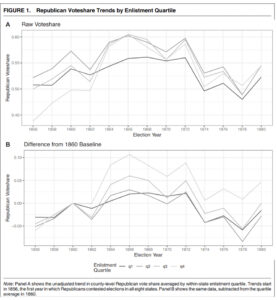
“Let our ballots secure what our bullets have won”: Union Veterans and the Making of Radical Reconstruction?
Editor's Note: This post is part of the Detailed: A Semi-Occasional series within Muster. Read the introductory post here. The passage and enforcement of the Reconstruction amendments is one of the most remarkable expansions of political rights in world history. Political scientists studying the expansion and contraction of political rights ...
Read More
Read More
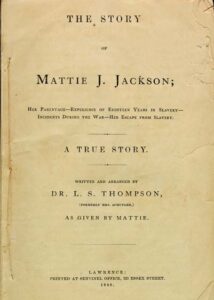
The Remarkable Story of Mattie J. Jackson
As a public historian working in St. Louis, Missouri, I am sometimes asked whether enslaved people living here before the Civil War ran away more frequently than enslaved people in the Deep South. Enslaved St. Louisians had the free state of Illinois across the Mississippi River, after all. While an ...
Read More
Read More
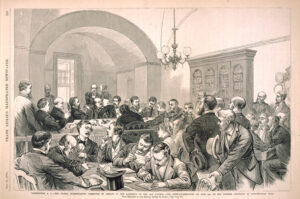
Challenging Exceptionalism: The 1876 Presidential Election, Potter Committee, and European Perceptions
In May 1878, the House of Representatives appointed Representative Clarkson N. Potter (NY-12) to investigate claims of fraud during the 1876 election. The commission, as Adam Fairclough untangles in his new book, uncovered massive wrongdoing on both sides, including so-called bulldozing by Louisiana Democrats, Republican election theft, and attempts to ...
Read More
Read More
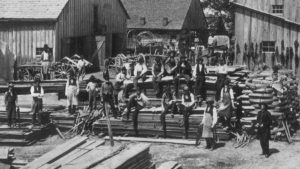
“I remember that Jasper Gray told me that he had herded sheep in Australia”
In 1906, Oscar Nelson, a local African American living in Tennessee, provided testimony on the extraordinary life of Jasper Gray, a United States Colored Troops (USCT) veteran, of the Thirty-First United Colored Infantry (USCI). Gray was a man whose entire life—in bondage and freedom—was one of constant physical movements and ...
Read More
Read More
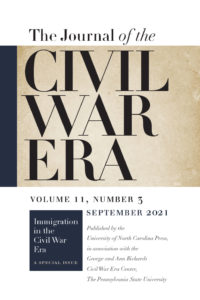
Previewing September 2021 Issue: Immigration in the Civil War Era
While recent immigration scholars have turned most of their attention to the twentieth century, many historians are also reexamining immigration policy in the mid-nineteenth century. Alison Clark Efford, in a recent review essay in this journal, reflects on how nineteenth-century immigration historiography is marked by an “imperial framework in which the ...
Read More
Read More
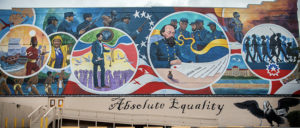
Juneteenth, Public Memory, and Teaching Reconstruction Through an International Perspective
A few weeks ago, the United States celebrated Juneteenth as a federal holiday for the first time. The bill recognizing the emancipation celebration passed the Senate and House and was signed into law by President Joe Biden in a matter of days, just in time for Americans to celebrate this ...
Read More
Read More
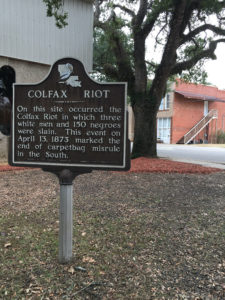
Removing the White Supremacy Marker at Colfax, Louisiana: A 2021 Success Story
On May 15, 2021, state officers, parish officials, and private citizens gathered in Colfax, Louisiana to watch local contractors remove an historical marker in front of Grant Parish Courthouse. Erected on June 14, 1951, the sign’s bold white letters announced that a civil disturbance claimed the lives of “three white ...
Read More
Read More

Congratulations to the Winner of The Journal of the Civil War Era’s George and Ann Richards Prize!
Catherine A. Jones has won the $1,000 George and Ann Richards Prize for the best article published in The Journal of the Civil War Era in 2020. The article, “The Trials of Mary Booth and the Post-Civil War Incarceration of African American Children,” appeared in the September 2020 issue. Drawn ...
Read More
Read More
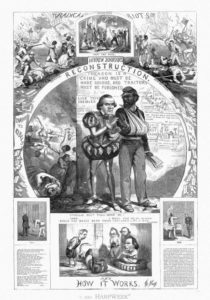
The Necessity of National Unity: Defeated Confederates’ International Appeals to Unity
Citizens were divided. Violence threatened the stability of the nation. After the violence ended, calls rose for unity. This pattern played out recently with calls to move past and forgive insurrectionists in the name of national unity following the January 6, 2021 attack on the US Capitol. Such a pattern ...
Read More
Read More
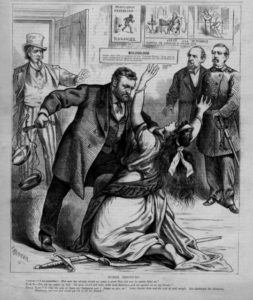
Grant’s Mixed Legacy
Books can have an impact. Readers without patience to wade through all 1,074 pages of Ron Chernow’s frequently cited biography are told in the introduction that Ulysses S. Grant was “the single most important figure behind Reconstruction” and that the “imperishable story of Grant’s presidency was his campaign to crush ...
Read More
Read More

Introducing Ann Tucker to the Muster Team
Muster is proud to introduce Ann Tucker as a regular contributor. Ann L. Tucker is an assistant professor of history at the University of North Georgia. She earned her BA at Wake Forest University and MA and PhD the University of South Carolina. Dr. Tucker’s areas of expertise include the US ...
Read More
Read More

Civil War Era Scholars Respond to January 6, 2021 Events and Aftermath
January 6, 2021 was a historic day in the nation’s history. Images of armed white men and women storming the Capitol Building carrying Confederate battle flags and other emblems flooded social media and television screens. Resulting in the death of two Capitol police officers, this twenty-first century contestation over Civil ...
Read More
Read More
Upcoming JCWE Webinars
The Journal of the Civil War Era is sponsoring three webinars with historians in coming weeks. For each event, JCWE editors Greg Downs and Kate Masur will interview the featured historian(s) and take questions from participants. Recordings will be posted on the JCWE's YouTube channnel. Please see below for more ...
Read More
Read More
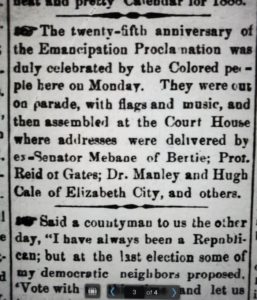
Civil War Day of Action: Filling Historical Silences
On the Journal of the Civil War Era national Day of Action. I am planning to join my former colleagues and community members in Elizabeth City, NC. Together, we are shedding light on the silenced diverse Civil War experiences, specifically freedpeople, USCT veterans and Grand Army of the Republic comrades ...
Read More
Read More
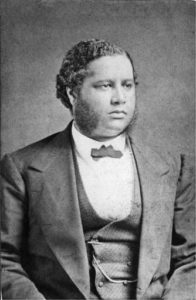
Fear of a Black Planet (Part 2)
See more here: Civil War History: A Call to Action. Thirty years ago, Public Enemy released what was arguably its best album, Fear of a Black Planet, which included the iconic track “Fight the Power.” I suspect many of you reading this have at least heard of the song (if ...
Read More
Read More
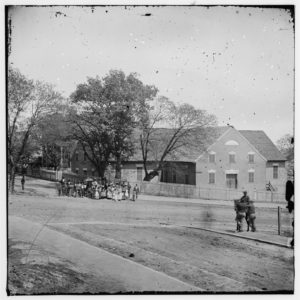
The Politics of Faith: How Contests within Sacred Space Shaped Post-Emancipation Society
In this roundtable, three historians present short excerpts from papers they would have presented at the 2020 meeting of the Society of Civil War Historians, which was cancelled due to Covid-19. The authors featured here explore how the wartime destruction of slavery shaped politics and power within Black churches, between ...
Read More
Read More
